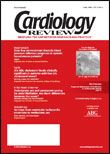Thromboprophylaxis for atrial fibrillation: Choose wisely
A 76-year-old woman was noted to have an irregular pulse while visiting her primary care physician for a blood pressure check.
A 76-year-old woman was noted to have an irregular pulse while visiting her primary care physician for a blood pressure check. Her medications included thyroxine in addition to bendroflumethiazide (Naturetin) and modified-release nifedipine (Adalat, Procardia) for hypertension, which was diagnosed 8 years earlier. The patient had a remote history of smoking 10 cigarettes per day, which she had given up 23 years earlier. She was not aware of any symptoms related to her irregular pulse. Her blood pressure was 124/84 mm Hg, and her heart rate was 80 beats/min and irregularly irregular. Results of her physical examination were otherwise normal. An electrocardiogram confirmed atrial fibrillation. Thromboprophylaxis was discussed, and a decision was made to initiate aspirin therapy at a dosage of 75 mg/day.
The patient remained well for the following 18 months and received regular evaluation for her hypertension. While having lunch with her daughter, she became sweaty and pale. Her speech became garbled, and she did not understand what her daughter was saying to her. The side of her face also became droopy. An ambulance was called, and by the time the patient arrived at the hospital, she had substantially improved, but was noted to have a weak right arm and some difficulty finding words. A computed tomography scan revealed some small vessel disease in the deep white matter of her brain. A carotid scan showed no significant stenosis. A diagnosis of a mild left cerebral hemisphere infarct was made.
Two weeks later, the patient had some continuing mild weakness and clumsiness of the right arm, and a sense that her right leg was dragging. She was started on warfarin (Coumadin), to achieve a target international normalized ratio of 2 to 3. One year later, the only residual symptom from the patient's stroke was a weak right hand, which limited her ability to write.
